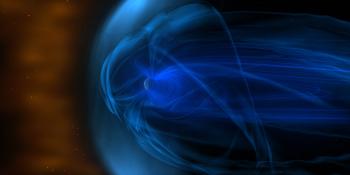Viewing archive of Wednesday, 25 June 2003
Solar activity report
Any mentioned solar flare in this report has a scaling factor applied by the Space Weather Prediction Center (SWPC). Because of the SWPC scaling factor, solar flares are reported as 42% smaller than for the science quality data. The scaling factor has been removed from our archived solar flare data to reflect the true physical units.
Report of Solar-Geophysical Activity 2003 Jun 25 2200 UTCPrepared by the NOAA © SWPC and processed by SpaceWeatherLive.com
Joint USAF/NOAA Report of Solar and Geophysical Activity
SDF Number 176 Issued at 2200Z on 25 Jun 2003IA. Analysis of Solar Active Regions and Activity from 24-2100Z to 25-2100Z Solar activity was low. The period was highlighted by a
very long duration C3.7 X-ray flare and CME that appears to have
originated from behind the NE limb. The likely source region of this
event is old Region 375 (N12, L=026) which was very large and
complex during its last transit of the visible disk. It is due to
make its return on the visible disk late on day two. Region 391
(N14W09) continues to grow, but after the burst of minor C-class
flares yesterday, it could only yield minor plage fluctuations this
period. No other noteworthy activity was observed.
IB. Solar Activity Forecast
Solar activity is expected to continue
at low levels. Increased activity is possible on days two and three
with the return of old Region 375.
IIA. Geophysical Activity Summary 24-2100Z to 25-2100Z
The geomagnetic field was quiet to active. A high speed coronal hole
stream continues with solar wind speed ranging from 520 to 620 km/s.
The greater than 2 MeV electrons at geosynchronous orbit reached
high levels today.
IIB. Geophysical Activity Forecast
The geomagnetic field is
expected to continue at quiet to active levels through day two. A
large southern coronal hole with a transequatorial extension will
move into a geoeffective position by day three; consequently,
occasional minor storm conditions are expected by the end of the
period.
III. Event Probabilities 26 Jun to 28 Jun
| Class M | 20% | 30% | 35% |
| Class X | 01% | 05% | 05% |
| Proton | 01% | 01% | 05% |
| PCAF | Green | ||
IV. Penticton 10.7 cm Flux
Observed 25 Jun 116 Predicted 26 Jun-28 Jun 115/120/130 90 Day Mean 25 Jun 125
V. Geomagnetic A Indices
Observed Afr/Ap 24 Jun 020/031 Estimated Afr/Ap 25 Jun 015/015 Predicted Afr/Ap 26 Jun-28 Jun 012/015-012/015-020/020
VI. Geomagnetic Activity Probabilities 26 Jun to 28 Jun
| A. Middle Latitudes | |||
|---|---|---|---|
| Active | 35% | 30% | 35% |
| Minor storm | 15% | 10% | 15% |
| Major-severe storm | 05% | 01% | 05% |
| B. High Latitudes | |||
|---|---|---|---|
| Active | 45% | 35% | 45% |
| Minor storm | 25% | 20% | 25% |
| Major-severe storm | 10% | 05% | 10% |
All times in UTC
Latest news
Latest forum messages
AR 4055 108Ask your obscure/"stupid" space weather questions. 372Incoming & Unnumbered Active Regions 1800Filaments and prominences 86JHelioviewer Tips and Settings 27
More topicsSupport SpaceWeatherLive.com!
A lot of people come to SpaceWeatherLive to follow the Sun's activity or if there is aurora to be seen, but with more traffic comes higher server costs. Consider a donation if you enjoy SpaceWeatherLive so we can keep the website online!

Space weather facts
| Last X-flare | 2025/03/28 | X1.1 |
| Last M-flare | 2025/04/22 | M1.3 |
| Last geomagnetic storm | 2025/04/21 | Kp5+ (G1) |
| Spotless days | |
|---|---|
| Last spotless day | 2022/06/08 |
| Monthly mean Sunspot Number | |
|---|---|
| March 2025 | 134.2 -20.4 |
| April 2025 | 121 -13.2 |
| Last 30 days | 113 -27.2 |


